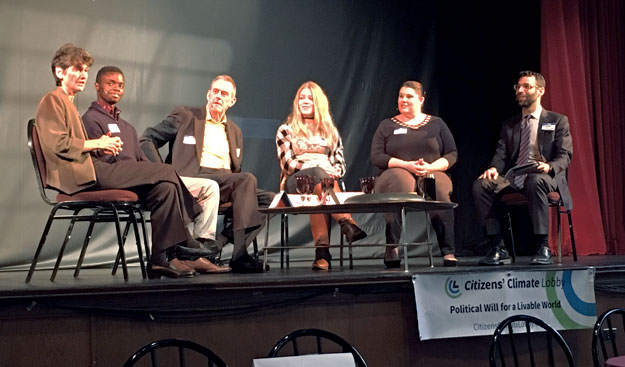
Right now Indianapolis is in the midst of the Spirit & Place Festival, an annual 10-day span of arts, religion, and humanities events throughout the city. This past weekend I attended a thought-provoking panel discussion about real solutions for climate change. The discussion not only reaffirmed my philosophy behind this blog and my sustainable events business, but also helped clarify the bigger picture of broad changes that need to happen in order to avoid the most disastrous effects of climate change.
Something I vaguely understood before the event was that the current Republican party is a significant impediment to meaningful climate policy. What the event clarified for me is the extent to which the Republican party is possibly the biggest hindrance to preventing climate disaster not only nationally but globally. (Because the U.S. is one of the biggest emitters of greenhouse gases, lack of action on our part has effects that reach far beyond our borders.)
The panel discussion opened with a screening of an episode of Years of Living Dangerously, a National Geographic series about climate change. Without being a witch hunt, the episode, entitled Safe Passage, laid out the political reality experienced by Republican lawmakers: Even if they personally believe in human-caused climate change and want to take action, they often face the withdrawal of major support, and even career-ending opposition from fossil fuel interests, if they go public in support of climate change policy. It’s not enough to simply convince Republican representatives of the science; they must also be provided with politically acceptable cover for their climate beliefs and action—that is, until the party changes its position officially.
Enter the Citizens’ Climate Lobby (CCL). This organization, one of the hosts of the panel discussion, takes a deliberate—sometimes slow—but effective approach to lobbying Republicans to address climate change. By training concerned citizens to effectively and respectfully discuss climate change with their representatives, and by appealing to Republicans on values like freedom and market-based strategies, CCL has influenced several Republican lawmakers to join the bi-partisan Climate Solutions Caucus, which now boasts 30 Republican members.
CCL’s ultimate goal is to introduce the Carbon Fee & Dividend solution as a bill in Congress. This concept would establish a fee for fossil fuel extraction that would be returned to U.S. households in the form of dividends to help offset resulting higher energy bills. The overall result would be a financial disincentive for fossil fuel use, leading to a market-based transition to cleaner forms of energy.
One of the things I like about CCL is their focus on encouraging people to get involved in our representative democracy. This is something I’ve been more intentional about over the last year or two, largely through email and social media alerts from the Hoosier Environmental Council (another presenter of the event). HEC sends periodic updates about pending environmental legislation in Indiana and at the federal level, with clear explanations of why they support or oppose certain policies, and how citizens can advocate for sound environmental policy. I’ve gotten a lot more comfortable contacting my elected officials, and even though a few years ago I wondered “Is that something people really do?”, now I consider it a quick and easy way to influence issues I care about.

The panel of speakers included Janet McCabe (left), who served as the EPA’s Acting Assistant Administrator for the Office of Air and Radiation under President Obama.
A theme that emerged from both the National Geographic episode and the panel discussion was the fact that we don’t have time for an incremental solution to climate change. While many articles about climate change talk about actions that individuals can take (such as driving less or eating less meat), these actions alone will not create the level of change needed to avert the most severe predictions of climate scientists. Change needs to happen faster than one individual citizen at a time—hence the focus on policy-based, industry-wide solutions.
A second, seemingly contradictory theme that emerged from the panel was the power of individual actions: specifically, how individual actions help people realize that they themselves have agency and can make an impact. This realization has the power to inspire individuals to take more and bigger actions, leading to greater change.
A high school science teacher on the panel gave a great example of how she helps her students begin to understand their impact. First she has students complete a carbon footprint calculator, and then she has the students calculate how many Earths would be necessary to sustain the global population if every person had the same carbon footprint they do. While this isn’t necessarily an example of an individual’s positive impact, this exercise helps students see themselves not as insignificant small-town kids, but as participants in a global system.
I see the two themes of the discussion as a natural progression. As citizens and humans, we first need to recognize our own impact on the world, and our ability to change that impact, before we begin to address the ills of the systems that compose society. For example, before someone can question the long-term viability of a consumption-based economy, they first need to consider the implications of their own consumption habits.
The action takeaway from the event was a marriage of individual and larger-scale action: CCL encouraged all attendees to fill out a form letter about climate change concerns (with space for personal comments) to their elected representatives, which CCL will deliver this month at their annual lobbying day in Washington, D.C. Taking this individual action is a building block toward the larger and more impactful goal of policy change—which, CCL emphasized, is unlikely to materialize without a chorus of voices in support of it.
I encourage you to check out Citizens’ Climate Lobby to learn more about their proposed solutions for climate change and to be inspired to contact your own representatives, not only about climate change, but about any issue that matters to you. As idealistic as it sounds, your representatives won’t know you care unless you tell them. It’s your responsibility to make your voice heard, and adding your voice to the collective support of an issue just may tip the scales toward policy change.

Thanks for this overview! I found it really interesting and helpful.